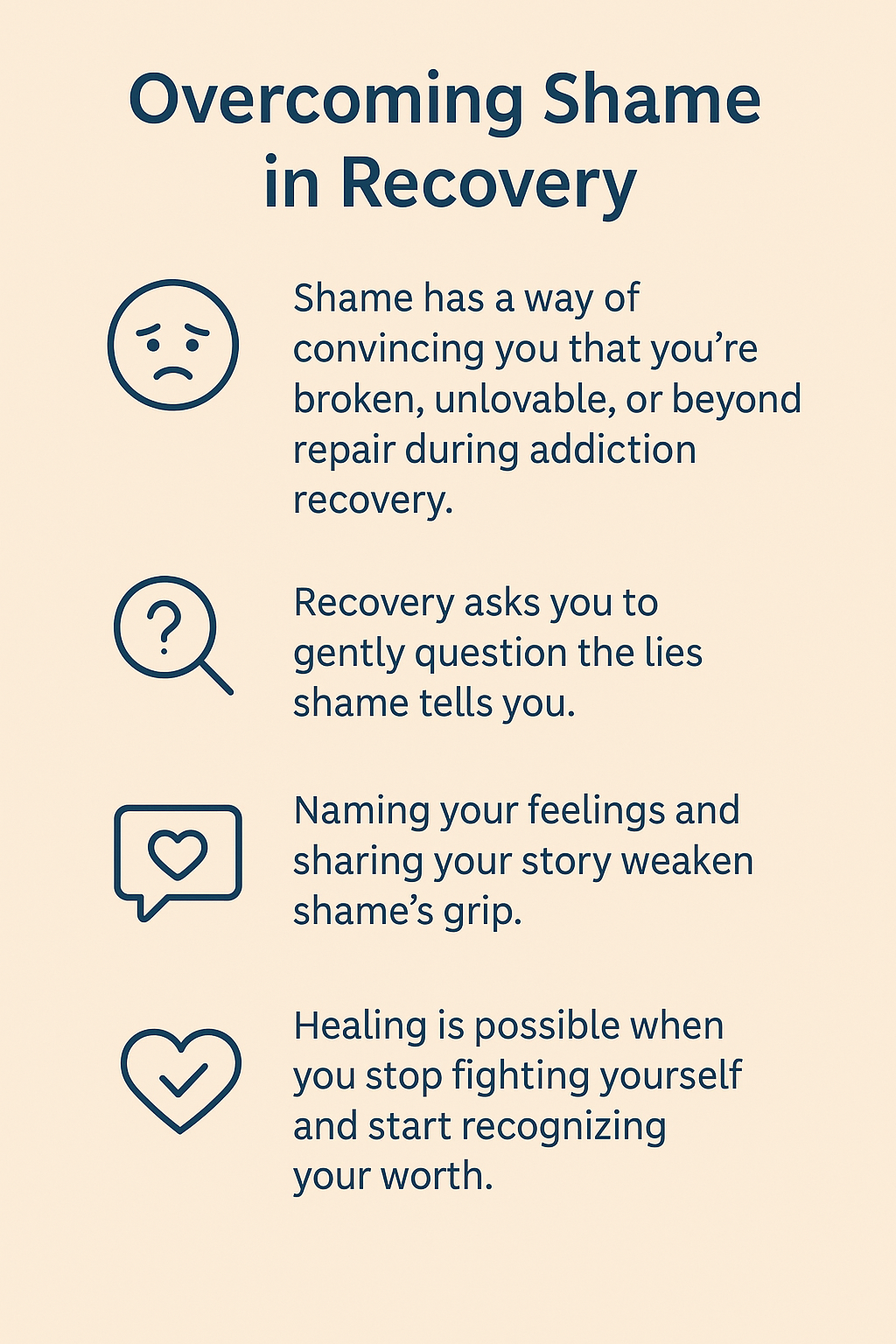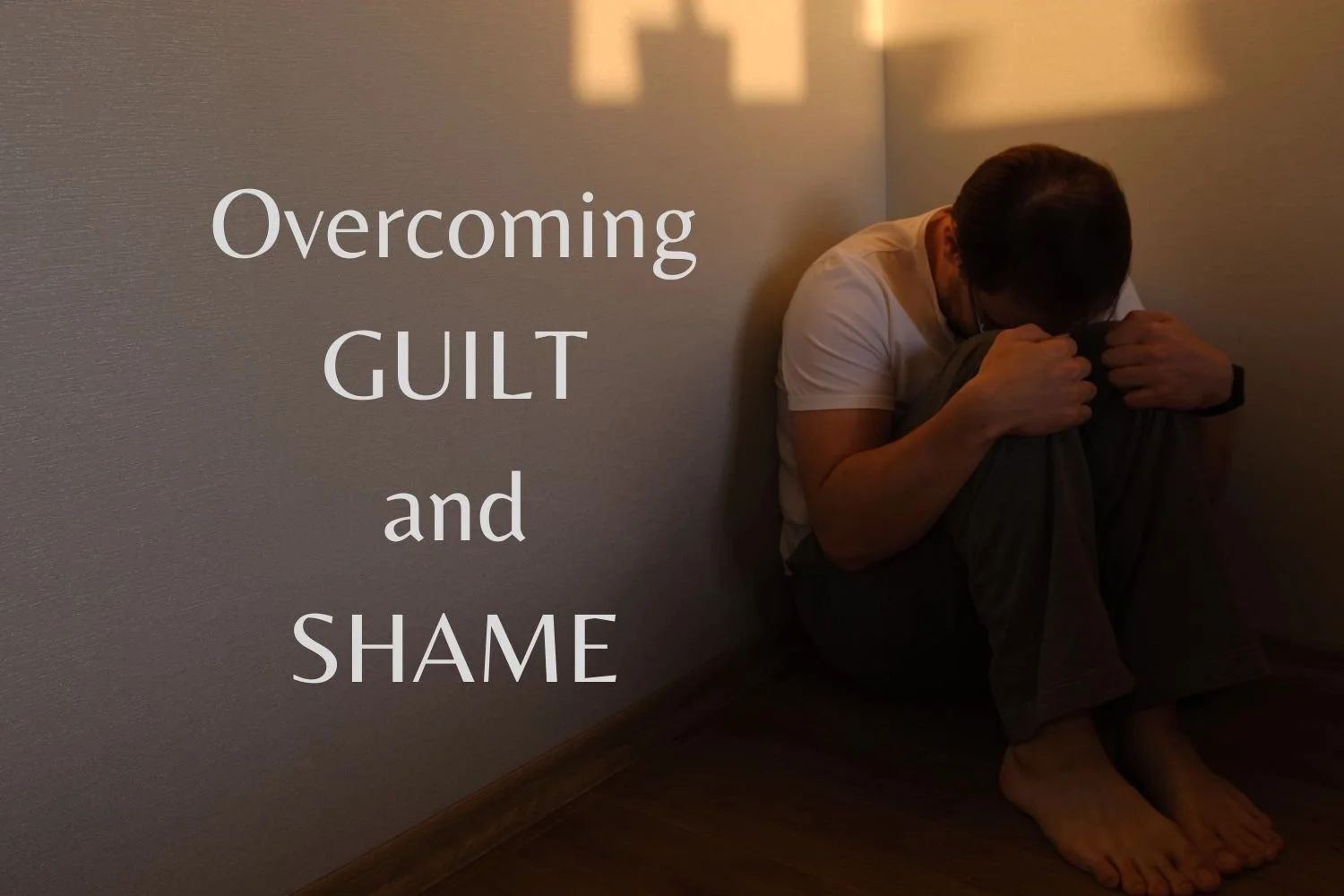Shame can feel incredibly heavy and isolating, especially for anyone navigating addiction. It’s not just embarrassment—it’s that deep, lingering belief that something is wrong with you at your core. And unlike passing emotions, shame tends to stick, quietly influencing how you see yourself and the choices you make. For many people struggling with addiction, shame becomes one of the hidden forces driving substance use. It offers a temporary escape from painful thoughts, but ultimately keeps the cycle going.
In this guide, I’ll walk you through how shame and addiction feed into each other, why acknowledging and understanding your shame is such a decisive step in recovery, and what real healing can look like when you start breaking free from it.
Understanding Shame and Its Role in Addiction
Shame usually isn’t something people talk about openly, but it’s everywhere when you look for it, especially with addiction. It can start early and be shaped by family, culture, or life events. Often, it’s the voice in your head saying, “I’m not good enough,” or “I don’t deserve better.” When shame sticks around, it can become a powerful motivator for unhealthy choices, including substance use, because escaping those harsh feelings gets really tempting.
Substance use can offer a short break from the discomfort of shame. But the relief never lasts, and when the effects wear off, shame comes back even stronger, often mixed with guilt over whatever happened while using. This cycle can get exhausting and make it tough for anyone to picture things getting better. Shame is pretty sneaky. It makes people hide, avoid support, and feel alone.
How Shame Fuels Addiction
When I started to learn more about why people stay stuck in addiction, I kept running into stories about shame. The more people feel ashamed, the less likely they are to ask for help, which only deepens their struggles. Here are some common ways shame feeds addiction:
- Isolation: Shame whispers that you’re the only one who feels this way, so you pull away from friends, family, and others who might help.
- Negative self-talk: The constant inner critic leads to thinking you’re hopeless or that recovery is pointless.
- Hiding behaviors: You might lie or refuse to talk about your struggles out of fear of being judged, creating more distance from support.
- Relapse triggers: When these feelings get overwhelming, it’s easy to reach for substances as a way to get some relief, restarting the addiction cycle.
Breaking the Shame Cycle in Recovery
Moving past shame is really important for healing, not just for avoiding substance use, but for feeling worthy of a better life. Here’s what’s helped me and others I know who’ve taken on this challenge:
Self-Compassion
Self-compassion doesn’t mean letting yourself off the hook for things you regret. Instead, it’s about recognizing that no one is perfect and that struggle doesn’t define who you are. One way I’ve practiced this is simply pausing, taking a breath, and reminding myself that pain and mistakes are part of being human. Researchers like Dr. Kristin Neff back this up. Being kind to yourself can really lower shame and boost recovery efforts.
Finding Safe Spaces to Share
Speaking openly in a judgment-free space, whether in therapy, a group, or with a trusted friend, goes a long way. Sharing stories and hearing from others helps break through the illusion of being alone. Most people in recovery groups will tell you: The first time you say out loud what you’ve kept in, it’s scary, but it also starts to loosen shame’s tight grip.
Learning to Separate Shame and Guilt
I used to mix up shame and guilt all the time, but they’re actually really different. Guilt is about feeling bad for something you did; shame is feeling bad about who you are. Realizing that a mistake doesn’t make you a bad person is a big switch-up. With support, you can address past actions without beating yourself up nonstop.
Steps to Start Healing from Shame
Recovering from addiction and healing from shame often happen together. Here are some steps that can make the process a bit smoother:
- Get Honest: Admitting what’s really going on, even if only to yourself at first, can break through the power of secrecy that shame holds.
- Reach Out: Connecting with others who understand, through 12-step meetings, support groups, or therapy, helps ease isolation.
- Challenge That Inner Critic: Whenever shame shows up, pause and question whether what it’s saying is actually true. Would you talk to a friend this way?
- Practice New Coping Skills: Instead of numbing out with substances, try activities that lift your mood, such as taking a walk, journaling, listening to music, or talking with someone supportive.
- Celebrate Small Wins: Any step toward recovery, even if it feels tiny, is worth acknowledging. Positive reinforcement does more than most people think.
Barriers to Overcoming Shame in Addiction Recovery
Letting go of shame isn’t always straightforward. Facing your experiences can bring up anxiety, grief, or frustration. I learned that the process gets easier when these typical barriers are on your radar:
- Stigma: Society often judges addiction harshly, making shame feel even heavier. It’s so common for people to worry about what others will think, especially in small communities or with family.
- Trauma: Many people living with addiction have experienced trauma in the past. When this isn’t addressed, it’s tough to untangle shame from other deep-seated emotions.
- Perfectionism: The belief that recovery has to be flawless or that you have to be “strong” all the time puts unreal pressure on yourself.
- Unrealistic Expectations: People sometimes hope shame will vanish instantly with sobriety. Healing is a longer adventure, with both forward steps and setbacks along the way.
Stigma and Community Support
Stigma can stop people from seeking help in the first place, so increasing understanding in your community (even if that’s just among your closest people) makes a huge difference. I’ve seen communities challenge stigma by using person-first language, saying “a person with addiction” instead of “addict,” and supporting public awareness events. Building supportive friendships or allies at work can also smooth the way for recovery. Even community programs in schools or workplaces can spark real change and give a boost to those who feel alone in their struggles.
Partnering with mental health advocates, joining support networks for families, and pushing for more accessible treatment options all set the bar higher for tackling stigma. When neighborhoods and workplaces make space for honest conversations, people are more willing to check in about their mental health. These steps can lift individuals and make recovery more possible. If you feel comfortable, sharing your own story (even one small piece at a time) helps get the word out that healing is real.
Beneficial Approaches and Practices for Healing
There isn’t just one way to work through shame, but several approaches show benefits for most people:
- Cognitive Behavioral Therapy (CBT): CBT helps reframe negative beliefs about yourself and interrupt automatic, self-defeating thoughts. Talking this through with a trained therapist guides the process.
- Mindfulness and Meditation: Mindfulness is about being present in the moment instead of getting lost in negative loops about the past. Even a few minutes of breathing exercises or guided meditation each day can build resilience over time.
- Group Support: Group therapy, 12-step programs, and peer support create space for honest talks and encouragement. Hearing relatable experiences can make someone feel less alone fast.
- Creative Expression: Art, music, or writing allows feelings to come out without having to find perfect words. I’ve heard from friends that even simple doodling helps process complex emotions.
Exercise can also make a big difference. Going for a walk, joining a beginner’s yoga class, or just dancing to your favorite song can help you feel more grounded and boost your mood. Taking care of your body helps remind you that you are worth looking after, no matter what shame tries to tell you. And over time, making a habit out of these practices sends your brain and heart the message that change is possible.
Real-World Scenarios: What Healing Might Look Like
It’s helpful to picture what progress can look like day to day. Maybe someone who’s been hiding their drinking starts opening up in a support group, or they try journaling about past regrets and start seeing themselves in a more forgiving light. For others, volunteering or reconnecting with family helps replace harmful beliefs with a sense of belonging and value. There’s no “right” way. The key is giving yourself a chance to grow beyond shame’s old scripts.
- Reconnecting with Old Friends: Many people describe feeling lighter when reconnecting with friends who support their new path, even if they lost touch during periods of addiction.
- Finding Joy in Small Things: Whether it’s a favorite meal, music, or quiet time outside, these little joys can start to replace the quick highs of substance use.
- Trying Something Creative: Making art, taking nature photos, or gardening are just a few ways to build confidence and see yourself in a new light.
Some also find inspiration by reading books or watching stories of others who’ve walked a similar path. Hearing about someone else’s recovery journey can spark hope and motivation. Look for podcasts, local talks, or online communities where sharing stories is the whole point. Knowing that others have stepped through shame and built new lives reminds us that progress is always possible—even when it’s slow or uneven.
Frequently Asked Questions
Sometimes the same questions about shame and addiction pop up over and over. Here are a few I hear most:
Question: Can you really get past shame after years of addiction?
Answer: Yes, it takes effort and support, but people do move past the hold shame has. It’s not about never feeling shame again, but learning how to recognize it, talk about it, and not let it control your choices.
Question: How do I talk to someone I care about who is struggling with shame in addiction?
Answer: Approach them with empathy and patience. Just listening without judgment can help them feel safe enough to open up. Avoiding labels or criticizing makes a big difference.
Question: What if I feel ashamed just by asking for help?
Answer: Feeling ashamed is really common at first. Every single person in recovery has been there. It gets easier the more you talk about it, and support groups and therapists expect these feelings. You’re definitely not alone.
Moving Toward Hope: Stepping Past Shame
Healing from shame in addiction is an adventure that comes with ups and downs, but it’s absolutely possible. Every step you take to acknowledge your story and reach out—to yourself, to others, or for professional help—matters more than you think. Building self-compassion, connecting with real support, and practicing new strategies can all help replace shame’s old story with a future full of hope.
Video: 3 Ways to Break Free from Shame in Addiction Recovery

